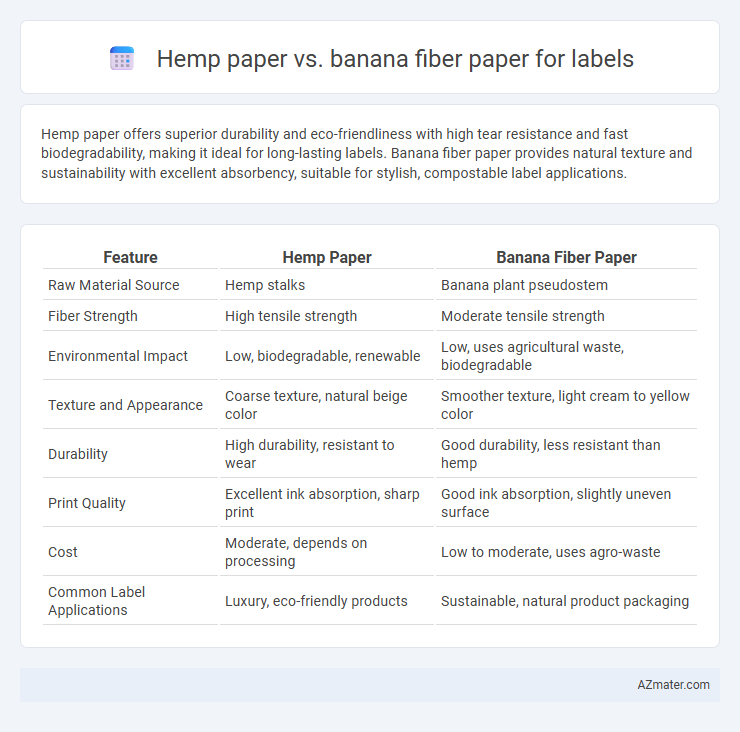Hemp paper offers superior durability and eco-friendliness with high tear resistance and fast biodegradability, making it ideal for long-lasting labels. Banana fiber paper provides natural texture and sustainability with excellent absorbency, suitable for stylish, compostable label applications.
Table of Comparison
| Feature | Hemp Paper | Banana Fiber Paper |
|---|---|---|
| Raw Material Source | Hemp stalks | Banana plant pseudostem |
| Fiber Strength | High tensile strength | Moderate tensile strength |
| Environmental Impact | Low, biodegradable, renewable | Low, uses agricultural waste, biodegradable |
| Texture and Appearance | Coarse texture, natural beige color | Smoother texture, light cream to yellow color |
| Durability | High durability, resistant to wear | Good durability, less resistant than hemp |
| Print Quality | Excellent ink absorption, sharp print | Good ink absorption, slightly uneven surface |
| Cost | Moderate, depends on processing | Low to moderate, uses agro-waste |
| Common Label Applications | Luxury, eco-friendly products | Sustainable, natural product packaging |
Introduction to Sustainable Label Materials
Hemp paper and banana fiber paper are emerging as eco-friendly alternatives for sustainable label materials due to their renewable sources and biodegradability. Hemp paper offers durability and resistance to wear, while banana fiber paper provides a unique texture and excellent strength, making both suitable for environmentally conscious branding. Utilizing these materials helps reduce reliance on traditional wood pulp, minimizing deforestation and carbon footprint in label production.
Overview of Hemp Paper
Hemp paper, derived from Cannabis sativa fibers, is known for its exceptional strength, durability, and resistance to tearing, making it an ideal choice for high-quality label applications. It offers superior environmental benefits, including rapid renewability and low chemical dependency during production, compared to traditional wood pulp paper. Its natural texture and ability to hold ink clearly provide a premium tactile and visual experience for eco-conscious branding on labels.
Insights into Banana Fiber Paper
Banana fiber paper offers a sustainable and durable alternative to traditional hemp paper for labels, featuring a unique texture that enhances brand aesthetics. Its natural fibers provide excellent tear resistance and printability, making it ideal for high-quality label production with eco-friendly appeal. The biodegradable nature and renewable sourcing of banana fiber paper support environmental responsibility while delivering a distinctive, artisanal look that stands out on retail shelves.
Environmental Impact Comparison
Hemp paper offers a significantly lower environmental footprint than traditional paper due to its rapid growth cycle, requiring less water and pesticides, while sequestering more carbon. Banana fiber paper, derived from agricultural waste, reduces landfill burden and promotes circular economy practices by repurposing banana plant pseudostems, but its processing can be energy-intensive. Comparing both, hemp paper's scalability and higher fiber yield make it a more sustainable option for eco-friendly labels with reduced deforestation impact.
Production Process and Resource Efficiency
Hemp paper is produced by breaking down hemp stalks through retting, followed by mechanical or chemical pulping to create a strong, durable fiber suitable for labels, with a notably high cellulose content contributing to its toughness and print quality. Banana fiber paper is made by extracting fibers from the pseudostems of banana plants, using eco-friendly enzymatic or mechanical processes that utilize agricultural waste, resulting in a sustainable material with natural texture and biodegradability. In terms of resource efficiency, hemp requires less water and pesticides compared to traditional wood pulp and grows rapidly, while banana fiber paper capitalizes on zero-waste use of discarded banana plant parts, minimizing cultivation resource inputs and promoting circular economy principles in label production.
Durability and Strength Analysis
Hemp paper exhibits superior durability and tensile strength compared to banana fiber paper, making it ideal for labels requiring long-lasting adhesion and resistance to wear. Hemp fibers are longer and more resilient, providing enhanced tear resistance and stability under varying environmental conditions. Banana fiber paper, while eco-friendly and biodegradable, tends to have lower tensile strength and may degrade faster, limiting its use in applications demanding high durability.
Print Quality and Aesthetic Appeal
Hemp paper offers superior print quality due to its smooth, uniform texture that ensures crisp, clear ink reproduction ideal for detailed labels. Banana fiber paper features a unique, fibrous texture enhancing aesthetic appeal with a natural, rustic look that attracts eco-conscious consumers. Both materials provide eco-friendly alternatives, with hemp paper delivering a professional finish and banana fiber paper emphasizing artisanal charm.
Cost and Market Availability
Hemp paper offers durability and biodegradability but comes at a higher cost due to limited large-scale production, impacting its availability in the label market. Banana fiber paper presents a more cost-effective alternative, benefiting from abundant raw material supply and growing adoption in eco-friendly packaging labels. Market availability of banana fiber paper is expanding rapidly in regions with established banana agriculture, making it a competitive choice for sustainable label applications.
Biodegradability and Recycling Potential
Hemp paper demonstrates superior biodegradability due to its natural cellulose content, breaking down faster in composting environments compared to banana fiber paper. While both materials offer excellent recycling potential, hemp paper often yields higher fiber quality during recycling processes, enhancing paper durability and reducing waste. Banana fiber paper remains a strong eco-friendly alternative with moderate biodegradability and is particularly valued for its unique texture and strength in sustainable label production.
Choosing the Best Fiber Paper for Labels
Hemp paper offers durability and resistance to moisture, making it ideal for labels exposed to varying conditions, while banana fiber paper provides a softer texture and eco-friendly appeal with excellent biodegradability. Choosing the best fiber paper depends on label requirements: hemp paper excels in strength and longevity, whereas banana fiber paper suits sustainable branding with a distinct tactile quality. Considering print quality, environmental impact, and intended use ensures the optimal selection for label applications.

Infographic: Hemp paper vs Banana fiber paper for Label
 azmater.com
azmater.com